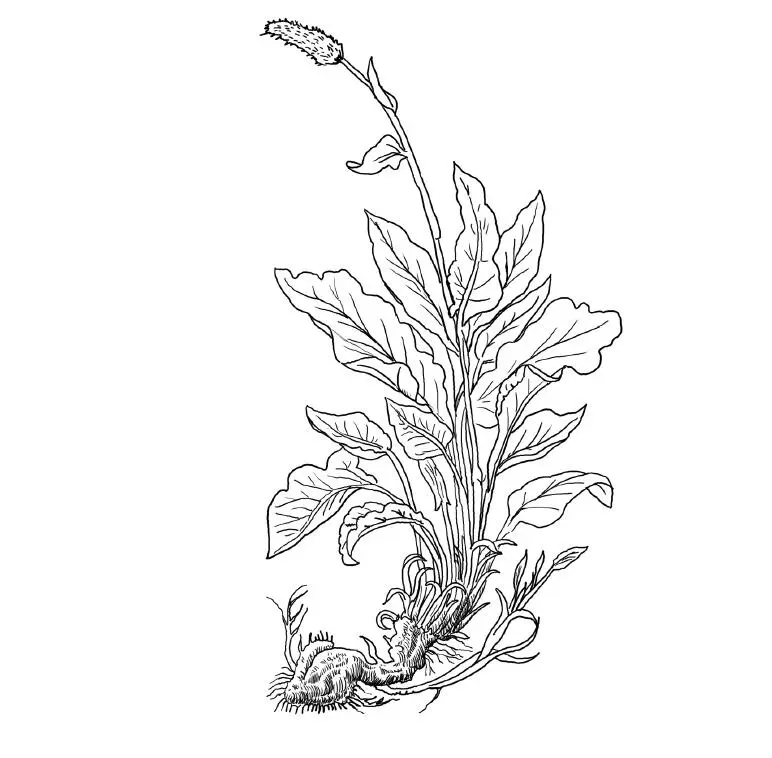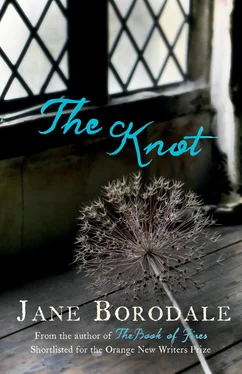JANE BORODALE
The Knot
Dedication
For my grandmothers, who both had green fingers
Epigraph
The good and vertuous Physition, whose purpose is rather the health of many, than the wealthe of himselfe, will not (I hope) mislike this my enterprise, which to this purpose specially tendeth, that even the meanest of my Countrymen, (whose skill is not so profound, that they can fetch this knowledge out of strange tongues, nor their abilitie so wealthy, as to entertaine a learned Physition) may yet in time of their necessitie have some helps in their owne, or their neighbors fields and
gardens at home.
henry lyte, A Niewe Herball
Contents
Title Page JANE BORODALE The Knot
Dedication
Epigraph
THE FIRST PART
Chapter I.
Chapter II.
Chapter III.
Chapter IV.
Chapter V.
Chapter VI.
Chapter VII.
Chapter VIII.
Chapter IX.
Chapter X.
Chapter XI.
Chapter XII.
Chapter XIII.
Chapter XIV.
THE SECOND PART
Chapter I.
Chapter II.
Chapter III.
Chapter IV.
Chapter V.
Chapter VI.
Chapter VII.
Chapter VIII.
Chapter IX.
Chapter X.
Chapter XI.
Chapter XII.
Chapter XIII.
Chapter XIV.
Chapter XV.
Chapter XVI.
Chapter XVII.
Chapter XVIII.
THE THIRD PART
Chapter I.
Chapter II.
Chapter III.
Chapter IV.
Chapter V.
Chapter VI.
Chapter VII.
Chapter VIII.
Chapter IX.
Chapter X.
Chapter XI.
Chapter XII.
Chapter XIII.
Chapter XIV.
Chapter XV.
Chapter XVI.
Chapter XVII.
THE FOURTH PART
Chapter I.
Chapter II.
Chapter III.
Chapter IV.
Chapter V.
Chapter VI.
Chapter VII.
Chapter VIII.
Chapter IX.
Chapter X.
Chapter XI.
THE FIFTH PART
Chapter I.
Chapter II.
Chapter III.
Chapter IV.
Chapter V.
Chapter VI.
Chapter VII.
Chapter VIII.
Chapter IX.
Chapter X.
Chapter XI.
Chapter XII.
Chapter XIII.
Chapter XIV.
Chapter XV.
THE SIXTH PART
Chapter I.
Chapter II.
Chapter III.
Chapter IV.
Chapter V.
Chapter VI.
Chapter VII.
Chapter VIII.
Chapter IX.
Chapter X.
Chapter XI.
Chapter XII.
Chapter XIII.
THE SEVENTH PART
Chapter I.
Chapter II.
Chapter III.
Chapter IV.
Chapter V.
Chapter VI.
Chapter VII.
THE EIGHTH PART
Epilogue
Acknowledgments
Author’s Note
Also by Jane Borodale
Copyright
About the Publisher Конец ознакомительного фрагмента. Текст предоставлен ООО «ЛитРес». Прочитайте эту книгу целиком, купив полную легальную версию на ЛитРес. Безопасно оплатить книгу можно банковской картой Visa, MasterCard, Maestro, со счета мобильного телефона, с платежного терминала, в салоне МТС или Связной, через PayPal, WebMoney, Яндекс.Деньги, QIWI Кошелек, бонусными картами или другим удобным Вам способом.
THE FIRST PART
The Place

1565
Chapter I.
Of BORAGE. Which endureth the winter like to the common Buglosse. The stalke is rough and rude, of the height of a foote and halfe, parting it selfe at the top into divers small branches, bearing faire and pleasant flowers in fashion like starres of colour blewe or Azure and sometimes white.
TWO HOURS OF DIGGING, and Henry Lyte still feels that unrecognizable discomfort.
Like a slight tipping, washing inside him, a darkish fluid lapping at his inner edges as though in a dusk, yet when he turns to it; nothing, nothing. Perhaps he is about to be unwell. Perhaps the Rhenish wine last night at supper was old or tainted, or he had too much of it.
A man of nearly thirty-six with all his health should not be troubled by sudden, unspecifiable maladies. Being at work on the garden out in the fresh air should be enough of a wholesome antidote to sitting hunched and bookish in his study, over his new, impossible manuscript that is going so slowly. There is satisfaction to be had from being outside instead, slicing and turning the light brown, clayish soil, breaking it into the kind of finer ground he needs for planting. The day has been good for October, bursts of rain giving way to bright sunshine, yet still it is not enough to distract Henry Lyte from being so ill at ease. He decides that as he can’t place the sensation, nor what provoked it, he will try to ignore whatever it is. Probably nerves, he thinks. It is not every day that a man is due to ride up to London to collect his new wife. His second wife, and they have been married for three months already, but she has not been to Lytes Cary yet. Within the week her postponed marital life and duties with Henry are to begin. He leans on his spade and considers the hulk of the manor house, the sky to the north dark behind, and wonders what she will make of it.
Lytes Cary Manor is made of limestone, a modest huddle of yellow gables and chimneys embedded comfortably on a mild slope of arable land where the Polden hills begin to rise up out of the damp flatness of the floodplain that is the Somerset Levels. The estate itself spreads down onto the damp moor in several places, but most of it sits on higher ground over a knoll in the crook of a bend in the river Cary, as far as Broadmead and Sowey’s Fields, then out onto the lower, uncertain ground of Carey Moor. Lytes Cary stands on the very brink of the Levels, and in winter these marshy acres to the south-west are inundated with shallow salty water from the sea and can be traversed only by boat. The Mendip hills are high and blue in the distance to the north, to the far south-west are the Quantocks, and to the near west, at about seven leagues off lies Bridgwater Bay, with its bustling port and the wide murky sea that stretches to Wales.
About the house sit diverse barns, the malthouse and dovehouse, and tenants’ cottages, many put up in his father’s time. Henry can still remember improvements being made to the house when he was a boy. The adjacent manor of Tuck’s Cary is almost uninhabited, just a handful of tenants, since Henry’s brother Bartholomew died of a pleurisy four years ago. There is also a hop yard, two windmills and several withy beds.
The new garden project here, however, is of his own devising.
To his knowledge, this part of the grounds has not been cultivated for at least two generations, though it lies alongside the kitchen garden that feeds the household, and the little plot in which his first wife Anys grew a few of the most vital herbs. Sheep have been folded here right up by the house on this grass during summers for years, so the soil has been kept fertile with dung, and it is level, south-facing, and as well-drained as any of this clay country is likely to be. Now the earth needs to be prepared and opened up, so that the frosts can penetrate the clods and break it down over the winter months.
He likes digging. He likes the pull of the spade against the earth, the tilting strain on his back, the mud drying on his palms. More accustomed to directing men than taking up the tools himself, he is always surprised at how much you can be changed by working physically till you ache. The world seems more vivid, more manageable. He does not feel it is at all beneath him as a man of status to be at work like this, instead he imagines his guardian spirit glancing down approvingly from time to time, saying, look, see how he takes charge of his affairs, because that is how it feels to be digging into the good soil with the iron spade and mattock.
Читать дальше













